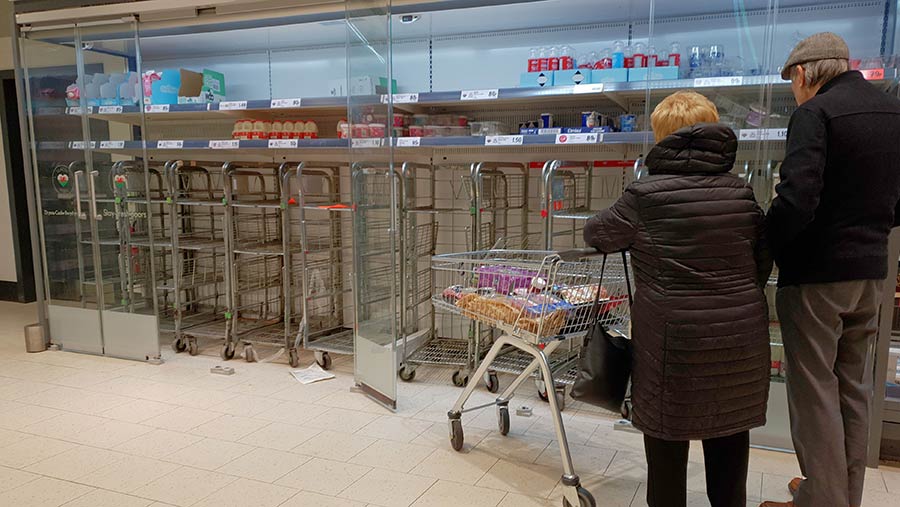Dairy sales boom overshadowed by coronavirus uncertainty
 © Dimitris Legakis/Shutterstock
© Dimitris Legakis/Shutterstock Retail demand for fresh milk and key dairy products has remained at a peak this week, as shoppers stock up amid the coronavirus lockdown.
According to AHDB Dairy the market has seen unprecedented changes as shoppers and food producers respond to new rules designed to combat the virus.
See also: Coronavirus: How financial support package will help farms
Demand for fresh milk, cheese, butter and dairy spreads are all raised, the levy board’s latest market update shows.
AHDB analyst Patty Clayton, the report’s author, explained that while supply chains were adapting to ensure food was produced and delivered, efforts were being overshadowed by the uncertainty.
She said: “Buyers are hesitant to commit, not knowing what future demand will be – which products will be needed, where will they be purchased and at what levels.”
In the current market dairy processors have no historic trends to guide them in what or how much product to make.
“In the short-term this uncertainty is likely to cause a high degree of volatility in markets,” Ms Clayton suggested.
Domestic dairy market
The main concern in the dairy supply chain is continuity of supply.
Although milk collections are continuing and the seasonal peak in production is yet to come, processors are concerned that a growing need for workers to self-isolate could disrupt supply.
“Any widespread need for self-isolation from staff could seriously affect a processing line’s ability to produce milk,” Ms Clayton warned.
“Transport networks between farm, factory and retailer would also be disrupted without access to skilled drivers,” she added.
To help reduce pressure on processing factory lines and maintain supply of basic products, food companies have agreed to streamline their product ranges.
Exports
To date, dairy product exports have remained stable despite issues with quarantine for transport drivers and increased border checks slowing deliveries across the EU.
The introduction of EU-wide measures, including fast-track or green lanes for food exports at borders and the relaxation of limits on driver hours, are expected to help overcome any delays.
Beyond Europe, an easing of restrictions at Chinese ports has helped to reduce a backlog of imports into that country.
This would also reduce the pressure on container availability in the future, Ms Clayton noted.
Wider food market
In the wider food market, the AHDB said, an initial analysis of changing demand had found that a third of shoppers admitted to stockpiling.
Grocery sales in retail are expected to have grown in March.
Early estimates suggest 33% of consumers have been stockpiling food since the coronavirus crisis worsened while 67% say they are worried about running out.
“In addition to observed stockpiling behaviour, many meals which would normally be eaten in food service have transferred to the home,” the AHDB added.
Long-life categories such as tinned, frozen and dried goods are preferred.
This has the potential to positively affect categories such as long-life milk, powdered milk, frozen meat and frozen chips.
The report said it might also benefit meat cuts that lent themselves to bulk cooking or freezing, such as mince and diced.
